Yes, All Men (Need to Listen)
Making Room for Womanhood in the American Theatre
The cursor taunts me.
Like a constant, maniacal wink that whispers, “Write something. I dare you.”
As a young playwright, I want to confront my opponent and litter this white canvas with black tic marks that will hopefully translate into a play. I look for inspiration from new plays written by fellow women playwrights like Dana Lynn Formby and Kristiana Rae Colón. Much like Formby and Colón’s work, my personal experiences of womanhood color my thoughts and flood into my plays. Stories of rape culture, reproductive rights, motherhood, daughterhood, and sisterhood spark my imagination and ignite a burning in my guts. A fire explodes when I think about the senseless debate over a woman’s individual need for safe and accessible healthcare and the pathetic excuse for childcare and maternity leave in this country. The smoke rises to the glass ceiling and I choke on the fact that a woman earns roughly only eighty cents to a man’s dollar (and the reality is even more dire for women of color). The burning spreads as I contemplate the war waged on women’s bodies in the form of verbal, emotional, and physical assaults.
My anger attempts to control my fingers to punch the key that will create the first tic mark on the page, but I stop. I stop because I realize the source of my rage is men and I’m terrified of what will happen to my play if I point an unwavering finger at the most privileged sex on this planet. I think about plays like Colón’s good friday and Formby’s American Beauty Shop and I wonder if they too will have a future on the American stage after their world premieres.
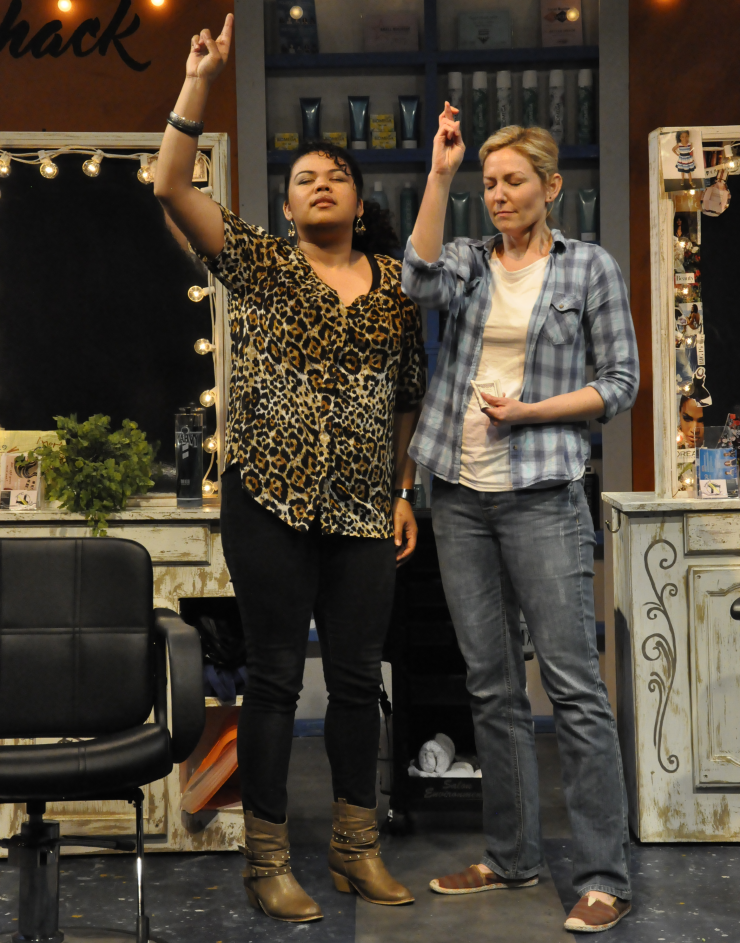
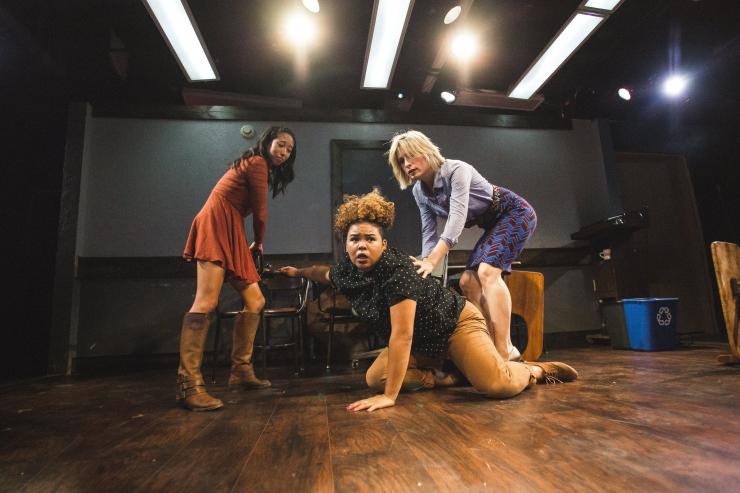
My concern is not unmerited. In The Atlantic article “The Sexist Reality that the Tony Nominations Just Highlighted,” Michele Willens revealed the lack of gender parity in the American theatre on the 2013-2014 Broadway stage. The same article commented that during the season Annie Baker won the Pulitzer Prize for The Flick closely followed by Lisa Kron and Jeanine Tesori for Fun Home, and Madeleine George for The Curious Case of the Watson Intelligence. However, the Broadway stage only featured two plays written by women, Sophie Treadwell and Lorraine Hansberry, both of them deceased.
While some may argue that for instance Fun Home did receive its Broadway moment a year later in 2015, we are still nowhere near true gender parity. American Theatre broke down the 2015-2016 season on stages all across the country and showed that a staggering 67 percent of the 1,914 productions counted were written by men. These numbers are nothing new. I myself am a member of 20% Theatre Company Chicago. Our company’s name is derived from a 2002 study that revealed only 20 percent of working theatre artists are women.
It’s really not surprising to see the gap between male and female playwrights when the majority of the gatekeepers to the American stage are men. A study by the Wellesley Centers for Women and the American Conservatory Theatre show that since 2013 women have never held more 27 percent of leadership positions for the American nonprofit theatre. The study goes on to note only fifteen women served as artistic directors or executive directors in the seventy-four LORT theatres.
With men in the driver seat of the American theatre, can we as women truly tell stories that may cast men as the bad guys? Or is the privileged fragility of the male ego silencing our voices and only allowing women to come along for the ride as long as we behave like good, little girls?
With men in the driver seat of the American theatre, can we as women truly tell stories that may cast men as the bad guys? Or is the privileged fragility of the male ego silencing our voices and only allowing women to come along for the ride as long as we behave like good, little girls?
Whenever I ask this question it is inevitable that someone (more than likely a man) will begin the “not all men” argument. Typically, this retort is prompted by a play that features no men or only men that are committing acts of violence and are not enlightened. The male commenter will go on to critique that since he has not caused harm to women the play does not properly represent men. Women playwrights might reconstruct their stories and add the “good guy” character. This lone male character in the play recognizes his privileges and constantly fights to protect the female protagonist from those “other” men.
Here is what those “not all men” believers need to understand. We as women do not need you to protect us, we need you to listen. We know it’s not “all men.” We write these stories so we can share with you a glimpse into our world. These stories and the oppressive male figures we create are real. We have looked into their eyes as they have attempted to take away our voices and rip open our bodies. When you say, “not all men” you are telling us you don’t believe our stories. You are essentially building a wall between yourself and our experiences of womanhood so that you can remain comfortable in your privilege. Just like the men in our plays, you too are looking us in the eyes and stripping away our voices.
These stories are not always pleasant. The plays can be brutal, messy, complicated, and bloody, but they need to be. The plays need to show our truths onstage and sometimes in order to be a good listener, that means men do not get to be included in the conversation.
I had the pleasure of viewing the Chicago Dramatists’ world premiere production of American Beauty Shop by Dana Lynn Formby, directed by Megan Schulman and Chicago’s Oracle Theatre’s world premiere of good friday by Kristiana Rae Colón, directed by Tara Branham. Both plays featured an all-female cast and unapologetically shouted our truths.
Formby stated, “I wrote a play with all women in honor of the women who raised me.”
American Beauty Shop is about a woman named Sue who is trying to send her daughter, Judy, off to MIT and keep her beauty shop, The Sugar Shack, afloat. During the play, Sue is in the process of patenting a new hair product that is sure to put The Sugar Shack back on the map. Complications strike when Judy finds out she is pregnant. What follows is a well-balanced and thoughtful argument about the pros and cons of the daughter getting an abortion or choosing to raise the baby. In the end, American Beauty Shop shows the importance of taking control of your life and being allowed to make your own choices.
According to Formby, “American Beauty Shop is about the American Dream and how hard it is to obtain.” The play does not stop with exploring just Sue’s American Dream; the play recognizes achieving the American Dream is far more difficult for women of color. Meg (a woman of color) and Sue (a white woman) might be business partners struggling to achieve the same financial goals for the The Sugar Shack, but Meg’s journey is further complicated when clients constantly profile her based on her race. Meg is often asked the question, “What kind of mix you got in there?” and cannot even walk into a mall to buy perfume without a store clerk asking for her identification. Formby combats ageism as well in the character of Helen. Helen is an exciting and opinionated woman that is a breath of fresh air for any actress over the age of sixty who wants to play anything else besides a stereotypical, withering grandmother.
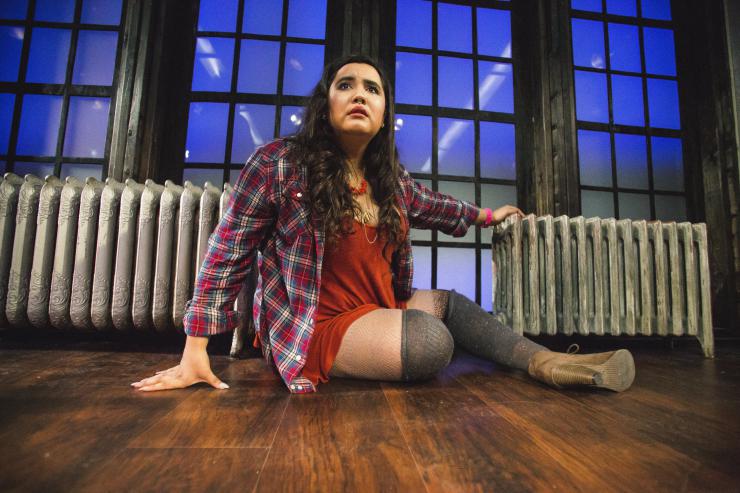
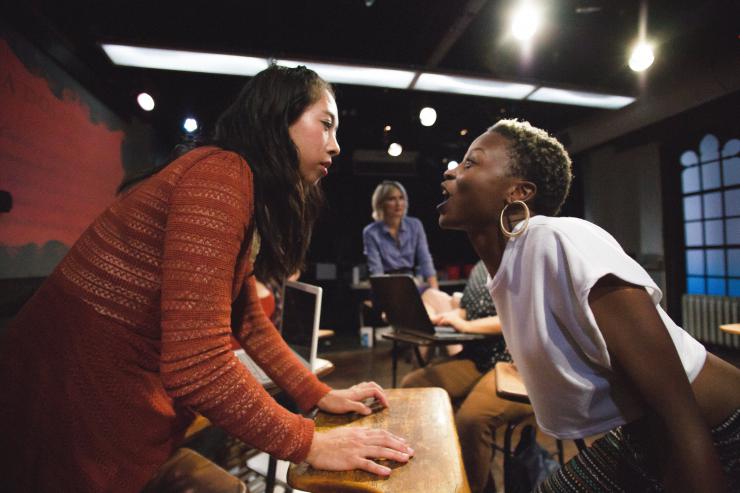
Colón’s good friday, asked: who is truly to blame for violence against women? This play did not mince words. Colón unrepentantly used her play to blatantly indict the patriarchy (and the men and women who support it) for the vicious attacks on women’s bodies and the popular acceptance of rape culture. The play takes place during a college campus shooting where a group of women lock themselves in their women’s studies class for safety. The fear that no one will believe a college woman’s sexual assault story forces one woman to take matters into her own hands and send a message to all the men across her campus. The production reveals the raw and painful truth these rape survivors must endure. The performance is filled with sounds of gunfire, props toppled over, the set smeared with blood, and the actresses baring their hearts and souls onstage. At the performance I attended, at the end of the play, the actresses took their bows then immediately formed a large circle, hugging and comforting each other. This was not because the play had done damage to them, but because the play had revealed a truth about womanhood that is often buried too deep in our hearts for words to comprehend.
Colón unrepentantly used her play to blatantly indict the patriarchy (and the men and women who support it) for the vicious attacks on women’s bodies and the popular acceptance of rape culture.
Plays like good friday and American Beauty Shop need to find more theatres willing to produce them across America. If the men in our field and in our audience are resolute in creating a more level playing field, then they will need to embrace our anger and support us by listening and believing in our stories. In order to change the dismal non-parity nature of the American theatre, each experience must be represented on the stage as well behind the scenes in administrative positions. We need to produce more plays by women of the LGBT community, genderqueer, women of color, and women with disabilities. Most importantly, though, we as women must lead by example and listen to each other.




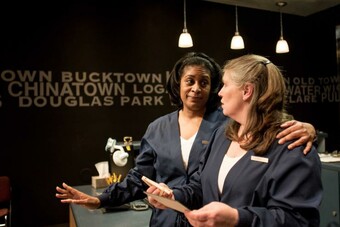

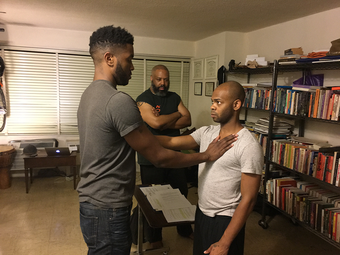

Comments
The article is just the start of the conversation—we want to know what you think about this subject, too! HowlRound is a space for knowledge-sharing, and we welcome spirited, thoughtful, and on-topic dialogue. Find our full comments policy here
"We need to produce more plays by women of the LGBT community, genderqueer, women of color, and women with disabilities. Most importantly, though, we as women must lead by example and listen to each other."
How about.... we need to produce more ORIGINAL PLAYS
How about.... we need to stop producing the same old plays by the same DEAD PLAYWRIGHTS!
How about.... we need to stop producing SHAKESPEARE all the damn time!
We're working in an archaic system where the people that have the money and make the decisions produce plays based on their personal taste and not based on risk taking and ground breaking choices!
White Male Writers aren't the enemy!
Female Writers aren't the enemy!
Writers of Color aren't the enemy!
We're all trying to hit a bullseye that is shrinking!
It's getting harder to find theatre companies that aren't doing Pay To Play programs and locking their doors to new writers! The best theatre companies have their core of talent and they don't need or want ANY new writers! DOESN'T MATTER SEX OR GENDER!!! THEY DON'T WANT YOU, ME, THEM, US OR ALIENS IN GREEN SKIN!
My first response to this discussion is not a defensive one so much as "is this a venue that is really going to benefit from having this discussion - again?" My second response to this discussion is "how is it that every new attempt at this discussion takes so little from the last/previous one?"
1. HowlRound is, in my experience, a pretty open minded and progressive thinking group of artists, writers, and readers. Most are aware of historical and contemporary problems of bias and representation. By our very nature, we have a tendency toward being marginalized and bullied... individually and as parts of our various groups and associations. We come to adulthood through the path of Outcast. So, with few exceptions, the participants of discussions are supportive and, mostly, in agreement that there remains imbalance.
Disagreement, if it exists, mainly lies examining cause - can we honor the historical 'canon' without being overly representative of white male playwrights and actors? can we continue to do time honored 'popular' works? or in working with appropriate solutions - how do we engage ethnically appropriate casting in regions where there simply aren't sufficient experienced artists of that ethnicity? how do we convince risk averse management and boards that different seasons can be successful without evidence?
But mostly, the people you need to have a dialogue with are not 'us' and it is mostly not the male artists who are working alongside you. We, like you, recognize the need for communication and that there are stories that are not being shared. That American audiences expect us to be, more and more, entertainers and not artists and that any message or challenge that we seek to include in our work must be subtle and not hinder the 'bottom line'. We, like you, make insignificant wages and require constant training and education, practical skills and a creative mind, emotional vulnerability and a strong drive to succeed simply to make a mark in this field. The ear that you need to bend is the one that determines the yardstick of success for our industry. The board members. The producers. The donors and investors.
These are the people who drive the choices in play selection. They are the ones that determine how much risk a theatre can take, how much art it can pursue amidst a season of selling tickets and entertaining. There need to be resources available to them that show what new works are available and how they are successful in ALL the ways that matter in making such suggestions. I can be supportive. I can offer you a sounding board for your ideas... but ultimately, I don't make the decisions that would change these things for even one company... and even if there are some Artistic Directors and Producers among the community here (or who read articles forwarded by their staff), there are probably very few board members who know we even discuss such things.
2. There are several conversations that I have seen between HowlRound, LinkedIn and a few other venues over the past few years that generally seem to start fresh each time the topic is brought up. That seems counterproductive to me. There are community/region 'artist counts' going on, that track hiring bias. There are a number of female playwright only new works series, reviewers who specifically track new works by women playwrights as a means of offering viable selections to bias sensitive season builders. I've personally made a recommendation of a group taking up responsibility for maintaining 'alternative' lists... options with female weighted casts, classical works with interpretations / contemporary scripts done by women writers, and so on - that can be published to Artistic Directors and Dramaturgs each year as seasons are being prepared. After all, even the best Dramaturgs can only recommend to their selection committees (or Artistic Directors) those things that they are aware of...
And each time this conversation is renewed, it should begin with a reflection on what steps have been taken... not just on a personal "which of you men will offer to support us on this and acknowledge the bias" sort of level, but more along the lines of what tools and resources have been developed since the last conversation that we can ALL use to make progress where the discussion needs to happen. We can certainly support what you say... but I'd rather support the efforts you are making to change minds and make decisions happen.
If it will help, I can comb through old mail/discussions and pull together a list of projects that have been mentioned in those?
I agree, William-- it would be helpful to start where we've left off in this discussion. It's easier to draw someone's ear if there is a new message, or a new take on an existing message. As a female playwright I would hate to see "listening fatigue" develop around this issue, as it's so important.
This article leaves me in a precarious position. Commenting in any way that could be taken as negative makes me disliked by most of the audience you were shooting for. Any disagreement with you will immediately create a large amount of assumptions in your head about me and what I believe. On that note I want to say none of this comes from a place of hate or discrimination.
You are making too many assumptions about men. You say that we have a “fragile ego” and don’t want to hear your stories so we can remain comfortable. Your generalizing 50% of the population, and I think It’s wrong to say we all share those beliefs. Like jj was saying people should all be treated as their own individual instead of thinking of them as part of this big “other” group.
Another factor you may be ignoring is what audiences want to see. By this I don’t mean what they are comfortable with but the type of show most people enjoy. A brief scroll through the highest grossing Broadway shows will show that what people want to see are plays with underlying universal themes and messages. Maybe in your attempt to showcase the problems of a certain group you’ve made the show unrelatable for half the audience, changing it from an enjoyable theater piece to a class that they just unknowingly paid to take.
I sincerely doubt that any male AD would stop you from having a male antagonist. Because that has never happened. Ever.
I have a radical idea on how to proceed: Let's stop judging people on race and gender. This includes white men. The Left's insistence on demonizing white men turned former Obama voters into Trump votes. Same counties, same states. Our strategy has failed, yet you continue to mock men as having weak egos and being privileged.
That doesn't work.
Another radical suggestion: Let's abandon the concept of privilege. I don't like it anymore than you, but by endlessly pounding on privilege we have lost too much. Let's stop doing it.
Just some suggestions.
No character is a "villain." Write real men and write what you want. The ones you want to reach will recognize themselves, and the ones who will never get it won't and it won't matter.